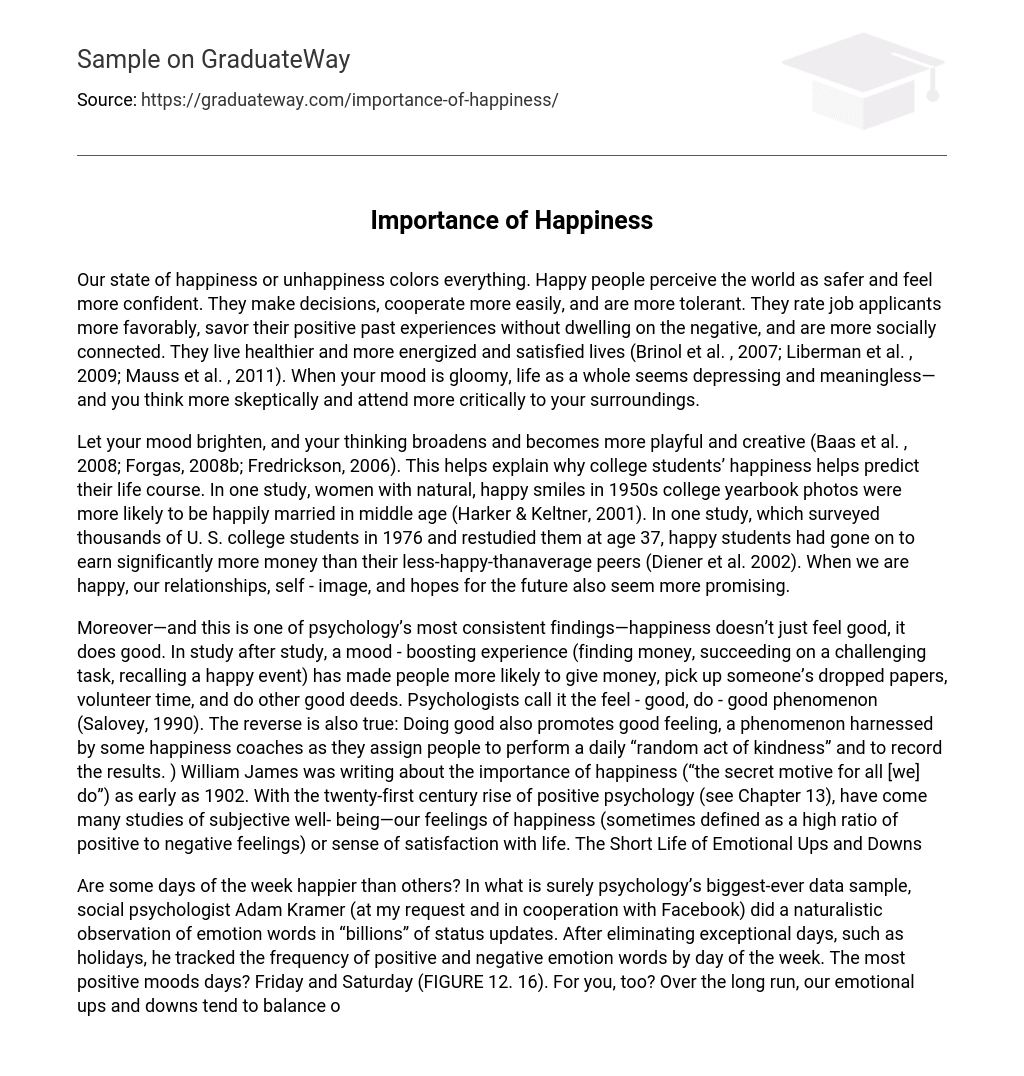Our state of happiness or unhappiness colors everything. Happy people perceive the world as safer and feel more confident. They make decisions, cooperate more easily, and are more tolerant. They rate job applicants more favorably, savor their positive past experiences without dwelling on the negative, and are more socially connected. They live healthier and more energized and satisfied lives (Brinol et al. , 2007; Liberman et al. , 2009; Mauss et al. , 2011). When your mood is gloomy, life as a whole seems depressing and meaningless—and you think more skeptically and attend more critically to your surroundings.
Let your mood brighten, and your thinking broadens and becomes more playful and creative (Baas et al. , 2008; Forgas, 2008b; Fredrickson, 2006). This helps explain why college students’ happiness helps predict their life course. In one study, women with natural, happy smiles in 1950s college yearbook photos were more likely to be happily married in middle age (Harker & Keltner, 2001). In one study, which surveyed thousands of U. S. college students in 1976 and restudied them at age 37, happy students had gone on to earn significantly more money than their less-happy-thanaverage peers (Diener et al. 2002). When we are happy, our relationships, self – image, and hopes for the future also seem more promising.
Moreover—and this is one of psychology’s most consistent findings—happiness doesn’t just feel good, it does good. In study after study, a mood – boosting experience (finding money, succeeding on a challenging task, recalling a happy event) has made people more likely to give money, pick up someone’s dropped papers, volunteer time, and do other good deeds. Psychologists call it the feel – good, do – good phenomenon (Salovey, 1990). The reverse is also true: Doing good also promotes good feeling, a phenomenon harnessed by some happiness coaches as they assign people to perform a daily “random act of kindness” and to record the results. ) William James was writing about the importance of happiness (“the secret motive for all [we] do”) as early as 1902. With the twenty-first century rise of positive psychology (see Chapter 13), have come many studies of subjective well- being—our feelings of happiness (sometimes defined as a high ratio of positive to negative feelings) or sense of satisfaction with life. The Short Life of Emotional Ups and Downs
Are some days of the week happier than others? In what is surely psychology’s biggest-ever data sample, social psychologist Adam Kramer (at my request and in cooperation with Facebook) did a naturalistic observation of emotion words in “billions” of status updates. After eliminating exceptional days, such as holidays, he tracked the frequency of positive and negative emotion words by day of the week. The most positive moods days? Friday and Saturday (FIGURE 12. 16). For you, too? Over the long run, our emotional ups and downs tend to balance out. This is true even over the course of the day (FIGURE 12. 17 on the next page).
Positive emotion rises over the early to middle part of most days and then drops off (Kahneman et al. , 2004; Watson, 2000). A stressful event—an argument, a sick child, a car problem—can trigger a bad mood. No surprise there. But by the next day, the gloom nearly always lifts (Affleck et al. , 1994; Bolger et al. , 1989; Stone & Neale, 1984). If anything, people tend to rebound from bad days to a betterthan – usual good mood the following day. Even when negative events drag us down for longer periods, our bad mood usually ends. Romantic breakups feel devastating, but eventually the wound heals. Faculty members up for tenure expect their





